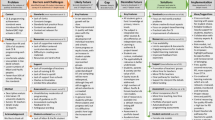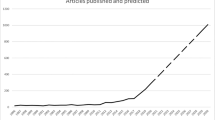Abstract
Computing Education Research (CER) is a branch of Discipline Based Education Research (DBER) and is a relatively young research area. The Uppsala Computing Education Research Group (UpCERG) can be an example of how this area has evolved from the mid-90s, when the group was started, until today, when CER is an established research area at Uppsala University with a research program and full professors. This case study involves searching for and building a community, formulating frameworks for conducting CER, finding and including methods, theories, and people from other disciplines, and developing relevant research questions for CER. The people in UpCERG represent a wide area of research interests, and the case study illustrates, to a large extent, the development of CER in general. The chapter will relate the UpCERG evolution to the CER field in general.
Access this chapter
Tax calculation will be finalised at checkout
Purchases are for personal use only
Similar content being viewed by others
References
Alghamdi, F.: Dimensions of Professionalism : A Study of Computer Science Teaching in Saudi Arabia. Acta Universitatis Upsaliensis (2020). URL http://urn.kb.se/resolve?urn=urn:nbn:se:uu:diva-418925
Berglund, A.: On the understanding of computer network protocols (2002)
Berglund, A.: Learning computer systems in a distributed project course : The what, why, how and where. Acta Universitatis Upsaliensis (2005). URL http://urn.kb.se/resolve?urn=urn:nbn:se:uu:diva-5754
Berglund, A., Daniels, M., Hedenborg, M., Tengstrand, A.: Assessment to Increase Students’ Creativity: Two Case Studies. European Journal of Engineering Education (2006). URL https://www.tandfonline.com/doi/abs/10.1080/0304379980230106. Publisher: Taylor & Francis Group
Berglund, A., Daniels, M., Pears, A.: Through the eyes of a research team: Using theory to enhance STEM Education. In: 2021 6th International STEM Education Conference (iSTEM-Ed), pp. 1–4. IEEE, Pattaya, Thailand (2021). URL https://ieeexplore.ieee.org/document/9625125/
Berglund, A., Foyer, P.O., Karlsson, V., Svärdström, A.: Full scale study with new approaches to examining the students on the engineering physics programme in Uppsala (1996). URL http://urn.kb.se/resolve?urn=urn:nbn:se:uu:diva-40255
Berglund, A., Thota, N.: A glimpse into the cultural situatedness of computer science : Some insights from a pilot study. In: International Conference on Learning and Teaching in Computing and Engineering (LaTiCE 2014), pp. 92–99. IEEE Computer Society (2014). URL http://urn.kb.se/resolve?urn=urn:nbn:se:uu:diva-226531
Boustedt, J.: On the Road to a Software Profession : Students’ Experiences of Concepts and Thresholds. Acta Universitatis Upsaliensis (2010). URL http://urn.kb.se/resolve?urn=urn:nbn:se:uu:diva-122304
Cajander, Å.: Usability – Who Cares? : The Introduction of User-Centred Systems Design in Organisations. Acta Universitatis Upsaliensis (2010). URL http://urn.kb.se/resolve?urn=urn:nbn:se:uu:diva-122387
Clear, T.: Valuing computer science education research? In: Proceedings of the 6th Baltic Sea conference on Computing education research: Koli Calling 2006, Baltic Sea ’06, pp. 8–18. Association for Computing Machinery, New York, NY, USA (2006). URL https://doi.org/10.1145/1315803.1315806
Clear, T.: Supporting the work of global virtual teams: the role of technology-use mediation. Thesis, Auckland University of Technology (2008). URL https://openrepository.aut.ac.nz/handle/10292/650. Accepted: 2009-06-14T23:48:49Z
Daniels, M.: Developing and Assessing Professional Competencies: a Pipe Dream? : Experiences from an Open-Ended Group Project Learning Environment. Acta Universitatis Upsaliensis (2011). URL http://urn.kb.se/resolve?urn=urn:nbn:se:uu:diva-145983
Daniels, M., Pears, A.: Models and methods for computing education research. In: Proceedings of the Fourteenth Australasian Computing Education Conference - Volume 123, ACE ’12, pp. 95–102. Australian Computer Society, Inc., AUS (2012)
Daniels, M., Petre, M., Almstrum, V., Asplund, L., Bjorkman, C., Erickson, C., Klein, B., Last, M.: RUNESTONE, an international student collaboration project. In: FIE ’98. 28th Annual Frontiers in Education Conference. Moving from ’Teacher-Centered’ to ’Learner-Centered’ Education. Conference Proceedings (Cat. No.98CH36214), vol. 2, pp. 727–732 vol.2 (1998). https://doi.org/10.1109/FIE.1998.738780. ISSN: 0190-5848
Eckerdal, A.: Novice Programming Students' Learning of Concepts and Practise. Acta Universitatis Upsaliensis (2009). URL http://urn.kb.se/resolve?urn=urn:nbn:se:uu:diva-9551
Engeström, Y.: Learning by Expanding: An Activity-Theoretical Approach to Developmental Research (2014). URL https://www.cambridge.org/core/books/learning-by-expanding/6D0648C3DEDE20157B359E464AFDB8C1. ISBN: 9781139814744 9781107074422 9781107640108 Publisher: Cambridge University Press
Faulkner, X., Daniels, M., Newman, I.: Open ended group projects (OEGP) : A way of including diversity in the IT curriculum. In: Diversity in information technology education : Issues and controversities, pp. 166–195. Information Science Publishing, London (2006)
Grande, V., Peters, A., Daniels, M., Tedre, M.: “Participating Under the Influence”: How Role Models Affect the Computing Discipline, Profession, and Student Population. In: 2018 IEEE Frontiers in Education Conference (FIE), pp. 1–9 (2018). DOI https://doi.org/10.1109/FIE.2018.8658944. ISSN: 2377-634X
Hamrin, P., Persson, M.: Exploring the Notion of Space in Virtual Collaborations : Finding Prerequisites for Success in Virtual Teams. undefined (2010)
Hattie, J.A.C.: Visible Learning: A Synthesis of Over 800 Meta-Analyses Relating to Achievement, 1st edition edn. Routledge (2008)
Hause, M.L.: Software development performance in remote student teams in international computer science collaboration. phd, The Open University (2004). URL http://oro.open.ac.uk/54622/
Holm, K.: Perceptions of the Concept of Evolution among Undergraduate Biology Students. In: EARLI Special Interest Group 9. Phenomenography and Variation Theory: Disciplinary knowledge and Necessary Conditions of Learning, University of Oxford, pp. 15–15 (2014). URL http://urn.kb.se/resolve?urn=urn:nbn:se:uu:diva-233032
Johnson, R.B., Christensen, L.B.: Educational Research: Quantitative, Qualitative, and Mixed Approaches, 3rd edition edn. SAGE Publications, Inc, Los Angeles (2007)
Klette, K.: The Role of Theory in Educational Research, (2011). https://9pdf.net/document/q5mr2357-the-role-of-theory-in-educational-research.html. Accessed 27 Jun 2022
Last, M.Z.: Investigating the group development process in virtual student software project teams. phd, Kingston University (2003). URL http://ethos.bl.uk/OrderDetails.do?uin=uk.bl.ethos.275111
Lave, J., Wenger, E.: Situated Learning: Legitimate Peripheral Participation, 1st edition edn. Cambridge University Press, Cambridge England ; New York (1991)
Leedy, P.D., Omrod, J.E.: Practical research: Planning and design. Pearson Educational International and Prentice Hal, Englewood Cliffs, N. J (2005)
Lishinski, A., Good, J., Sands, P., Yadav, A.: Methodological Rigor and Theoretical Foundations of CS Education Research. In: Proceedings of the 2016 ACM Conference on International Computing Education Research, ICER ’16, pp. 161–169. Association for Computing Machinery, New York, NY, USA (2016). URL https://doi.org/10.1145/2960310.2960328
Malmi, L., Sheard, J., Kinnunen, P., Simon, Sinclair, J.: Development and Use of Domain-Specific Learning Theories, Models and Instruments in Computing Education. ACM Transactions on Computing Education (2022). URL https://doi.org/10.1145/3530221. Just Accepted
Malmi, L., Sheard, J., Simon, Bednarik, R., Helminen, J., Kinnunen, P., Korhonen, A., Myller, N., Sorva, J., Taherkhani, A.: Theoretical underpinnings of computing education research: what is the evidence? In: Proceedings of the tenth annual conference on International computing education research, ICER ’14, pp. 27–34. Association for Computing Machinery, New York, NY, USA (2014). URL https://doi.org/10.1145/2632320.2632358
Marton, F.: Necessary Conditions of Learning. Routledge (2014). Google-Books-ID: bbzcAwAAQBAJ
Marton, F., Booth, S.A.: Learning and Awareness. Psychology Press (1997)
McMillan, J.H., Schumacher, S.: Research in Education: A Conceptual Introduction, 5th edition edn. Allyn & Bacon, New York (2000)
Pears, A., Seidman, S., Eney, C., Kinnunen, P., Malmi, L.: Constructing a core literature for computing education research. ACM SIGCSE Bulletin 37(4), 152–161 (2005). URL https://doi.org/10.1145/1113847.1113893
Pears, A., Thota, N., Kinnunen, P., Berglund, A.: Harnessing theory in the service of engineering education research. In: 2012 Frontiers in Education Conference Proceedings, pp. 1–5 (2012). DOI https://doi.org/10.1109/FIE.2012.6462292. ISSN: 2377-634X
Pears, A.N., Daniels, M.: Structuring CSed research studies: connecting the pieces. ACM SIGCSE Bulletin 35(3), 149–153 (2003). URL https://doi.org/10.1145/961290.961553
Reason, P., Bradbury-Huang, H. (eds.): Handbook of Action Research: Participative Inquiry and Practice, 1st edition edn. SAGE Publications Ltd, London ; Thousand Oaks, Calif (2001)
Suppes, P.: The Place of Theory in Educational Research. Educational Researcher 3(6), 3–10 (1974). URL https://doi.org/10.3102/0013189X003006003. Publisher: American Educational Research Association
Szabo, C., Sheard, J.: Learning Theories Use and Relationships in Computing Education Research. ACM Transactions on Computing Education (2021). URL https://doi.org/10.1145/3487056. Just Accepted
Tedre, M., Pajunen, J.: Grand theories or design guidelines? Perspectives on the role of theory in computing education research. ACM Transactions on Computing Education (2021). URL https://doi.org/10.1145/3487049. Just Accepted
Tenenberg, J., Malmi, L.: Editorial: Conceptualizing and Using Theory in Computing Education Research. ACM Transactions on Computing Education (2022). URL https://doi.org/10.1145/3542952. Just Accepted
Thomas, G.: How to Do Your Case Study, second edition edn. SAGE Publications Ltd, Los Angeles (2015)
Valentine, D.W.: CS educational research: a meta-analysis of SIGCSE technical symposium proceedings. ACM SIGCSE Bulletin 36(1), 255–259 (2004). URL https://doi.org/10.1145/1028174.971391
von Hausswolff, K.: Practical thinking in programming education: Novices learning hands-on. Acta Universitatis Upsaliensis (2022). URL http://urn.kb.se/resolve?urn=urn:nbn:se:uu:diva-461455
Vrieler, T., Salminen-Karlsson, M.: A Sociocultural Perspective on Computer Science Capital and its Pedagogical Implications in Computer Science Education. ACM Transactions on Computing Education (2021). URL https://doi.org/10.1145/3487052. Just Accepted
Vygotsky, L.S.: Mind in Society: Development of Higher Psychological Processes. Harvard University Press (1980). URL http://www.jstor.org/stable/10.2307/j.ctvjf9vz4. Cole, Michael and Jolm-Steiner, Vera and Scribner, Sylvia and Souberman, Ellen
Wiggberg, M.: Computer Science Project Courses : Contrasting Students’ Experiences with Teachers’ Expectations. Acta Universitatis Upsaliensis (2010). URL http://urn.kb.se/resolve?urn=urn:nbn:se:uu:diva-120081
Author information
Authors and Affiliations
Corresponding author
Editor information
Editors and Affiliations
Rights and permissions
Copyright information
© 2023 The Author(s), under exclusive license to Springer Nature Switzerland AG
About this chapter
Cite this chapter
Daniels, M., Berglund, A., Pears, A. (2023). A Case Study: The Uppsala Computing Education Research Group (UpCERG). In: Apiola, M., López-Pernas, S., Saqr, M. (eds) Past, Present and Future of Computing Education Research . Springer, Cham. https://doi.org/10.1007/978-3-031-25336-2_12
Download citation
DOI: https://doi.org/10.1007/978-3-031-25336-2_12
Published:
Publisher Name: Springer, Cham
Print ISBN: 978-3-031-25335-5
Online ISBN: 978-3-031-25336-2
eBook Packages: Computer ScienceComputer Science (R0)




